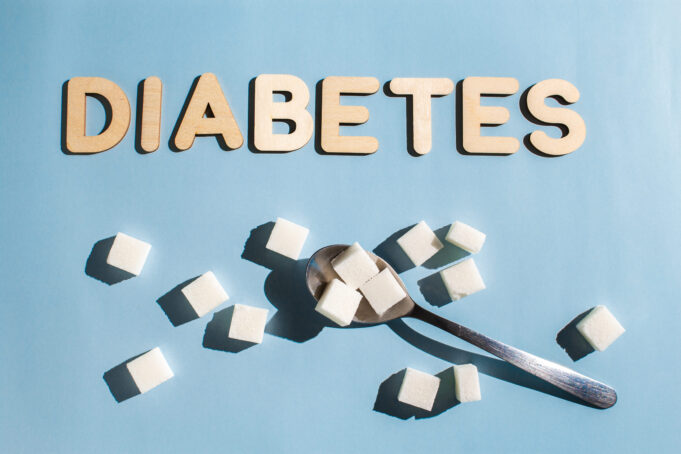Diabetes symptoms may go undiscovered for years in the early stages since the most typical signals of high blood sugar don’t always make you feel unwell. However, several crucial and “strange” signs of diabetes in the body, such as dark patches of skin and fruity-smelling breath, should not be overlooked.
Diabetes is a widespread disease that affects around four million individuals in the United Kingdom. If you develop diabetic symptoms, you should see a doctor as soon as possible; however, how can you know whether you’re in danger?
Here, leading experts delve into the top 5 most unusual side effects of the condition, which may indicate signs of diabetes.
Dark patches on the skin
Skin disorders are frequent among diabetics due to high blood sugar levels, which impact your blood vessels and nerves. Many diabetics acquire a condition known as acanthosis nigricans (AN), which is characterised by a dark band of velvety skin that usually appears on the back of the neck.
Dr Julietta Gusarova, Cosmetic Doctor working with RegenLab explains: “Acanthosis Nigricans can also be discovered in various parts of the body where the skin folds, such as the palms, armpits, or groyne, in many people. In addition to the visible colouring associated with the disorder, some people say their skin feels thicker.”
Acanthosis nigricans is a condition rather than a disease. It’s a symptom of another problem, i.e. diabetes; and it’s a sign that you should seek medical help.
The majority of treatment focuses on the underlying disease that is causing it. A healthcare expert may advise you to maintain a healthy weight if you’re overweight. They may also prescribe drugs to aid with blood glucose control.
While controlling glucose levels and maintaining a healthy weight is certainly beneficial, there will be certain individuals who lack confidence due to severity of the skin pigmentation.
Dr Gusarova adds: “In recent years, microneedling combined with PRP – a non-invasive cosmetic procedure that encourages collagen creation has become increasingly popular for individuals who are suffering with pigmentation due to diabetes.
Microneedling in combination with PRP has been proven to be one of the most effective treatments for skin discoloration. It is chemical-free and allows the body to repair itself by reducing hyperpigmentation on the skin.”
Sweet smelling breath
When it comes to your breath, there’s a lot more to consider than when you last washed your teeth. Your breath, for example, can reveal how your body is metabolising the stuff you ingest.
Eating a high-protein diet or being in ketosis—both typical goals on modern diets like keto—can cause your breath to smell fruity or acetone-like. If you have diabetes, this odour could indicate diabetic ketoacidosis (DKA), a life-threatening illness if left untreated.
According to the UK National Diabetes Audit, DKA affects roughly 4% of individuals with type 1 diabetes in the United Kingdom each year. While this is a more common symptom for those suffering with type 1 diabetes, it can also occur in patients with type 2 diabetes. So, what to look out for?
Without enough insulin, a person’s body is unable to convert blood sugar to glucose, which the body needs as fuel. The body enters a severe form of ketosis when it doesn’t have enough glucose to burn, releasing enough ketones into the blood to poison the person.
DKA is characterised by fruity breath, however other indicators include:
- Increased thirst and a dry tongue
- Urination on a regular basis
- Blood sugar levels that are too high
- Confusion
Sexual Dysfunction
When you have a chronic illness, it’s easy to put sex on the back burner. Healthy sexuality and sexual expression, on the other hand, are at the top of the list when it comes to sustaining one’s quality of life, regardless of other issues.
Type 2 diabetes patients are no exception. It’s critical to detect and treat sexuality difficulties that diabetes patients face.
Dr Agnieszka Nalewczynska, Consultant Gynaecologist working with RegenLab explains: “Vaginal dryness is the most frequent sexual health concern associated with type 2 diabetes in women.
Diabetes increases the risk of vaginal infections and inflammation in women – both of these factors might make sex uncomfortable. Women with diabetes are also more prone to get urinary tract infections on a regular basis (UTIs), which can result in sex becoming more painful and uncomfortable.
Dr Nalewczynska explains that PRP can be used to reduce discomfort during intercourse, as well as increase arousal and alleviate vaginal dryness. “Increased sexual confidence and a fresh perspective on how sex may play a beneficial role in your and your partner’s lives can emerge from greatly reduced or eliminated discomfort.”
Increase in muscle to fat ratio
Another symptom of diabetes is the loss of muscle mass and the increase in fat mass.
Insulin resistance in the brain’s satiety regions is a major cause of weight gain. We may not feel hungry until we begin eating, yet we do not feel satisfied and are unable to turn it off.
Muscle loss is caused by a combination of high blood sugar levels and fat (lipid) levels in the blood that is taken up by muscle cells. The oxidative and inflammatory consequences result in the loss of muscle cells and subsequent muscular atrophy. In the later stages of diabetes, this lowered muscle-to-fat ratio tends to worsen (and insulin resistance).
While leading a healthy lifestyle is absolutely crucial when you’re suffering with diabetes, the nature of the disorder can make it incredibly difficult.
Whether you have diabetes or not it is important to lead a healthy lifestyle and implement exercise/resistance training into your daily routine.
Bruising and slow healing time
Did you know…wounds could take longer to heal in people with diabetes, which increases the risk of infection?
Minor cuts, burns, and wounds are an inescapable part of life. These injuries, however, can cause major health problems in those who have diabetes.
Many diabetics suffer from wounds that take a long time to heal, heal poorly, or never heal at all – an infection may also occur at any time. An infection can spread from a wound to nearby tissue and bone, as well as to other parts of the body. An infection can be life threatening or even deadly in some situations if it is not treated quickly enough.
Hagen Schumacher, a leading Consultant Plastic Surgeon at Adore Life explains: “For those suffering with diabetes, they may also have complications when it comes to medical procedures and surgery.
When having a surgical treatment, people with diabetes are at an increased risk, especially if they have high blood sugar regularly or have brittle diabetes, which means they have trouble managing their glucose levels. Due to slower healing times, high chances of infection, poor wound healing amongst many other factors, diabetics are at higher-risk when it comes to surgery and procedures.
With that being said, Hagen offers some advice for those looking to go under the knife – “the better your diabetes management, the more likely you are to have a successful surgery. If the diabetes is well managed, I have no concern with operating on patients. Many diabetics are looking after their sugar levels very well and I have not seen any increased complication risks in this group.
It’s critical to keep your blood glucose levels within the ranges recommended by your doctor. It is also necessary to have an excellent diet, which includes high-quality protein. Protein is a crucial component of the healing process that can aid in quicker wound healing, stronger tissue at the surgical site, and a greater capacity to tolerate the stresses of surgery.
This is the moment to give up drinking or smoking. Eliminating alcohol from your diet will improve your blood glucose management, and stopping smoking will help you return to breathing without the use of oxygen or a ventilator more quickly.”
Do you have a story? Email holly@harleystreetcommunications.co.uk













